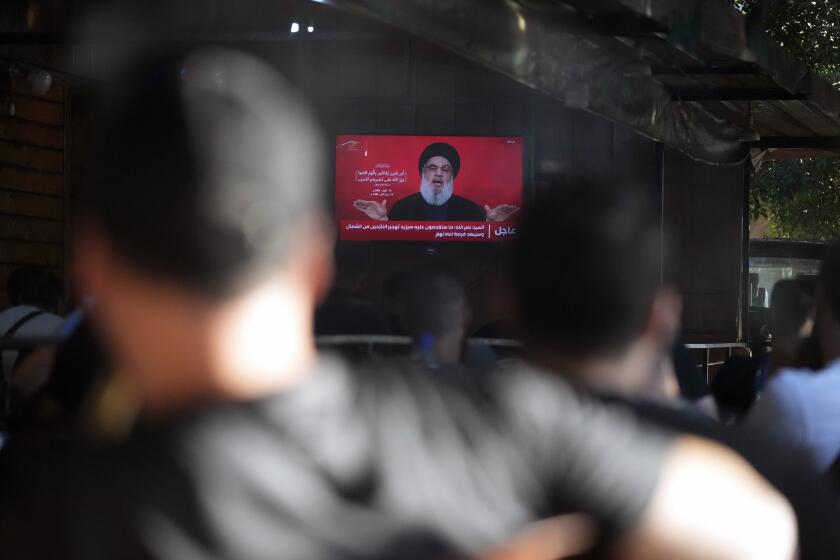Chaos at Guantanamo tribunal
Five men accused of plotting the Sept. 11 terrorist attacks turned what might have been their last appearance before a Guantanamo court Monday into a tribute to Osama bin Laden and a call on fellow holy warriors to strike the U.S. with weapons of mass destruction.
Khalid Shaikh Mohammed and his alleged co-conspirators renewed their vows to die as martyrs at the hands of the U.S. military, offering to plead guilty and dispense with pretrial matters to hasten their execution.
Mohammed mocked the tribunal for its bureaucracy and dismissed his Navy lawyer for having served in Iraq, where U.S. troops have been “killing our brothers and sisters.”
But given the chance to enter pleas later in the day, Mohammed and two others declined because they were concerned that pleading guilty without a military jury present might make them ineligible for a sentence of death.
The judge newly assigned to the Sept. 11 defendants’ case, Army Col. Stephen R. Henley, asked government lawyers whether rules for the military commissions, as the trials are known, allowed him to find the men guilty.
The law enacted by Congress two years ago calls for a military jury of at least 12 members to sentence a defendant to death. No jury has been assembled because the court had expected to address only pretrial issues this week. The proceedings are the last scheduled before the Bush administration leaves office.
The tribunal’s chief prosecutor, Army Col. Lawrence J. Morris, said the confusion about the death penalty arose because the Uniformed Code of Military Justice that governs military courts-martial prohibits guilty pleas in capital cases to protect defendants from being railroaded to execution.
Henley also declined to allow two of the men, Ramzi Binalshibh and Mustafa Ahmed Hawsawi, to represent themselves until the court reviews their psychiatric evaluations.
Upon learning that they wouldn’t be allowed to enter their pleas together, the five said they would wait until they could stick with their strategy of united action.
In a dramatic finale to a day in court that was watched by nine people who lost loved ones in the attacks in New York, Pennsylvania and at the Pentagon, Binalshibh proclaimed the defendants’ allegiance to Bin Laden and his international jihad against the U.S.
“I want to send my greetings to Osama bin Laden, and I want to reaffirm my allegiance. I hope the jihad continues and strikes the heart of America with all kinds of weapons of mass destruction,” said Binalshibh, a Yemeni who allegedly provided the logistics for the sleeper cell in Hamburg, Germany, where three of the hijackers lived until 2000.
The families watched the military court proceedings from behind a glass partition. Maureen Santora brought photos of her son, Christopher, and 35 other firefighters killed in the World Trade Center so they could symbolically confront their alleged killers.
“Their demeanor showed a complete absence of contrition,” said Hamilton Peterson, whose father and stepmother died when United Airlines Flight 93 crashed into a field in Pennsylvania. “It was clear to me they know what they did and are willing and want to plead guilty.”
A tearful Alice Hoagland, whose son Mark Bingham died in the same crash, said she thought Americans should demonstrate a respect for life that was greater than the defendants’ by sparing the men.
“There are worse things than death, and one would be to spend their lives under the total control of people they hate,” Hoagland said. “They do not deserve the glory of execution.”
Henley said he would consider defense motions before the competency determinations on Binalshibh and Hawsawi, which can’t take place until late this month at the earliest. A lawyer for Binalshibh, Navy Cmdr. Suzanne Lachelier, told the judge the matters were unlikely to be settled before February or March, based on the prosecution’s slow delivery of evidence.
Monday’s proceedings dragged on in seeming defiance of the impending reality of a new U.S. administration committed to closing the Guantanamo prison and tribunal.
The Bush administration has carried on with pretrial hearings for the Sept. 11 suspects and a handful of others from among the 250 prisoners here, but prosecutors have been bogged down by the uncertain procedures of a court created in haste to replace one struck down as unconstitutional by the Supreme Court.
After being allowed to meet together for a defense strategy session on Nov. 4, Mohammed and the others wrote a letter to Henley asking that all motions filed by their lawyers be dismissed so they could immediately enter guilty pleas.
Four of the five had expressed the desire to die as martyrs during their arraignment in June, conceding their guilt. The fifth, Hawsawi, apparently joined them during the session last month.
Henley didn’t review the letter until Sunday because rules require that communications from “high-value detainees” be read only in secure facilities. Henley said he didn’t have access to the top-security venue until Sunday.
“I don’t know -- are the military commissions using carrier pigeons or what?” Mohammed said to Henley in English.
--
More to Read
Sign up for Essential California
The most important California stories and recommendations in your inbox every morning.
You may occasionally receive promotional content from the Los Angeles Times.











